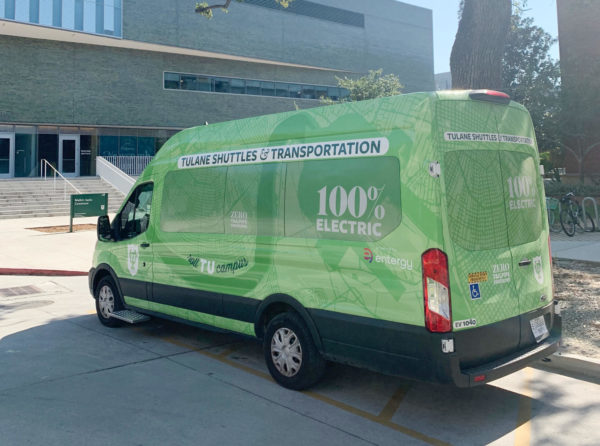
Students may have noticed new additions to the Tulane University transportation system this year: electric shuttles.
Nine new electric vehicles recently took to the streets as part of Tulane’s shuttle transportation fleet. The shuttles are part of a grant the U.S. Department of Energy awarded Tulane in late 2020.
Among the DOE 2020 Innovative Vehicle Technologies Projects, the “Demonstrating Electric Shuttles for the New Orleans Region” project won over $730,000 to “support clean energy deployment and energy infrastructure reinvestment to reduce greenhouse gas emissions and air pollution.”
Core teams in Tulane’s Department of Shuttles and Transportation, Office of Sustainability and the ByWater Institute, along with Entergy, Model 1 and the Southeast Louisiana Clean Fuel Partnership, developed the grant proposal to the DOE’s Office of Energy Efficiency and Renewable Energy.
This year is the third budget period of Tulane’s project approach. After a year of preparation and groundwork, including shuttle and charging station design, site preparation, electrical service and fleet accessory upgrades, Tulane is ready to demonstrate the EV shuttles’ capabilities and collect data on their environmental impact and financial costs.
Opponents of EVs are concerned that the cost of producing and powering them is worse than that of conventional vehicles.
Under the Renewable & Clean Energy Portfolio Standard, however, Tulane uses clean sources to power the shuttles, and they are confident in the net benefit of these shuttles over time.
“The electric shuttle vehicles are projected to outperform their conventional counterparts from the start,” Director of Sustainability Jordan Stewart said. “Unlike their predecessors, the carbon emissions performance of the electric shuttles will improve as cleaner modes of generating electricity come online.”
Although long term data is not yet available, New Orleans may realize the effects of clean energy production soon.
“The nine new electric fleet vehicles produce zero tailpipe emissions,” Stewart said. “Zero tailpipe emissions translates into less air pollution along the streets of New Orleans.”
Tulane Shuttles and Transportation System offers over 260,000 rides annually to the Tulane community. The nine EV shuttles are expected to take over a significant portion of this.
The hope is for the practical use of EV shuttles at Tulane to provide “lessons … from operating the electric fleet, to fleet managers in the New Orleans area,” Stewart said.
Students say that EV shuttles offer a more comfortable and enjoyable experience.
“It was magical,” sophomore Estefania Cardona said. “It was fast, smooth, good air conditioning.”
They “were a lot nicer because you couldn’t feel the potholes, and it was a lot more comfortable and quiet,” Cardona said.
This clean transportation initiative by Tulane follows the U.S. Clean Energy Financing Program’s mission under the Energy Policy Act of 2005. Since then, Entergy New Orleans and Tulane established their climate initiatives: the Renewable and Clean Portfolio Standard and the Climate Action Plan.
Tulane seeks 30% greenhouse gas emissions reductions by 2025, and both initiatives seek climate neutrality by 2050.
“Implementing electric vehicles, high-performance buildings, and the Bernhard energy management plan are all examples of how Tulane plans to achieve these goals,” Stewart said.



Leave a Comment